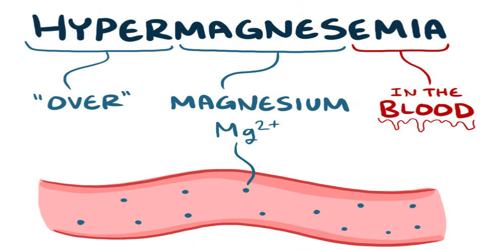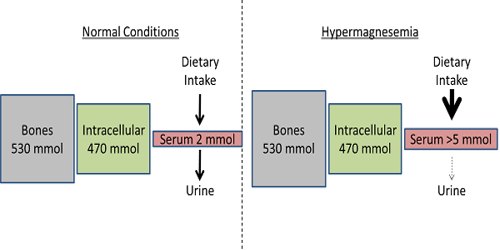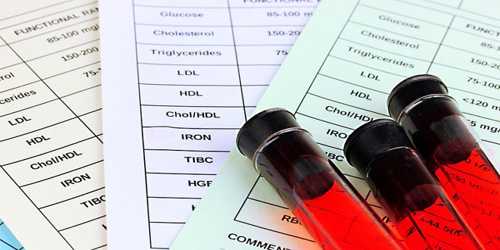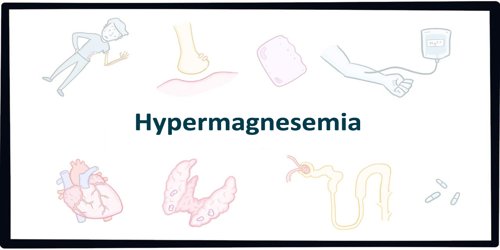Hypermagnesemia
Definition
Hypermagnesemia is a disorder of serum electrolyte balance caused by the abnormally high concentration of magnesium in the blood. It is defined as a level greater than 1.1 mmol/L. Symptoms include weakness, confusion, decreased breathing rate, and cardiac arrest. Hypermagnesemia is a rare medical condition, occurring in patients with impaired kidney function.

In healthy people, very little magnesium circulates in the blood. The gastrointestinal (gut) and renal (kidney) systems regulate and control how much magnesium the body absorbs from food and how much is excreted in urine. These systems control how much magnesium the body absorbs from food and how much is excreted in urine. A healthy body maintains a level of 1.7 to 2.3 milligrams per deciliter (mg/dL) of magnesium at all times.
Kidney disease is one of the main causes of hypermagnesemia. Persons with impaired kidney function should be especially careful about their magnesium intake because they can accumulate magnesium, which is dangerous and sometimes fatal.
Causes and Symptoms of Hypermagnesemia
Hypermagnesemia is very uncommon because, generally, our kidneys do a very good job at eliminating excess magnesium. Thus, the most prevalent cause of hypermagnesemia is renal failure, or when kidneys don’t work properly. Some antacids, such as Maalox, Rolaids, and Mylanta, contain magnesium, and taking these in excess could also lead to hypermagnesemia. However, typically there must be an underlying kidney condition for hypermagnesemia to develop.
Magnesium status depends on three organs: uptake in the intestine, storage in the bone and excretion in the kidneys. Hypermagnesemia is therefore often due to problems in these organs, mostly intestine or kidney.

Hypermagnesemia can be seen in 10 to 15 percent of hospitalized patients, usually in the setting of renal failure. Plasma magnesium levels rise as renal function declines since there is no magnesium regulatory system other than urinary excretion. Parenteral magnesium is commonly used to decrease neuromuscular excitability in pregnant women with severe preeclampsia or eclampsia. The usual plasma concentration achieved is 5 to 7 meq/L (6 to 8.4 mg/dL or 2.5 to 3.5 mmol/L), but much higher levels can occur.
Most of the symptoms of hypermagnesemia are caused by excess Mg2+ blocking calcium channels in all smooth, skeletal, and/or cardiac muscle cells. In addition, the severity of symptoms is correlated with magnesium levels. In other words, the higher your serum magnesium levels, the worse the symptoms. The most common symptoms are listed here:
Weakness, nausea and vomiting
- Impaired breathing
- Decreased respirations
- Low blood pressure
- Low blood calcium
- Abnormal heart rhythms and asystole
- Decreased or absent deep tendon reflexes
- Low heart rate
- Dizziness
Particularly high levels of magnesium in the blood can lead to heart problems, difficulty breathing, and shock. In severe cases, it can result in coma.

Diagnosis and Treatment of Hypermagnesemia
Hypermagnesemia is diagnosed using a blood test. The level of magnesium found in the blood indicates the severity of the condition.
The first step in treating hypermagnesemia is identifying and stopping the source of extra magnesium. An intravenous (IV) calcium supply is then used to reduce symptoms such as impaired breathing, irregular heartbeat, and hypotension, as well as the neurological impact.
Intravenous calcium, diuretics, or water pills may also be used to help the body get rid of excess magnesium. People with renal dysfunction or those who have had a severe magnesium overdose may require dialysis if they are experiencing kidney failure, or if magnesium levels are still rising after treatment. Dialysis, when kidney function is impaired and the patient is symptomatic from hypermagnesemia.
People with underlying kidney issues are at risk of developing hypermagnesemia because their kidneys may not be able to excrete enough magnesium.
Avoiding medications that contain magnesium can help prevent complications. This includes some over-the-counter antacids and laxatives. Doctors are advised to test for hypermagnesemia in anyone with underperforming kidneys who experiences the associated symptoms.
Reference:
















